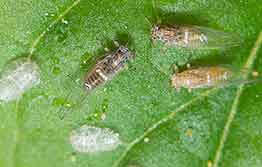Movement restrictions into Queensland due to tomato potato psyllid in WA
The Queensland Department of Agriculture and Fisheries is undertaking surveillance of Queensland crops from the Solanaceae (potato, tomato, eggplant, capsicum, chilli) and Convolvulaceae (sweet potato) plant families following the detection of tomato potato psyllid (Bactericera cockerelli) in Western Australia.
 The tomato potato psyllid affects horticultural crops and is also capable of transmitting the bacterium Candidatus Liberibacter solanacearum, which causes the devastating plant disease known as zebra chip in potatoes.
The tomato potato psyllid affects horticultural crops and is also capable of transmitting the bacterium Candidatus Liberibacter solanacearum, which causes the devastating plant disease known as zebra chip in potatoes.
As a result, movement restrictions will now apply to solanaceous and convolvulaceous plants or plant material and associated media, machinery or equipment coming into Queensland, unless they meet certain conditions outlined in the Movement Control Order.
The Movement Control Order is effective immediately, as of 17 February 2017, and will stay in effect for three months unless revoked earlier.
New South Wales and South Australia have also implemented movement restrictions, with other jurisdictions expected to follow suit shortly.
Queensland has issued state-wide area freedom certificates for tomato potato psyllid and Candidatus Liberibacter solanacearum to enable trade of fruit and plant material of the Solanaceae family and tubers and plant material of the Convolvulaceae family from Queensland.
However, businesses are reminded to check the quarantine requirements for the entry of plants or plant material and associated media, machinery or equipment of the Solanaceae and Convolvulaceae families prior to export.
The adult tomato potato psyllid is a small, winged insect about three millimetres long that resembles a miniature cicada. Their life cycle includes nymph and egg stages, all of which may be present on affected plants.

The tomato potato psyllid is a sap-sucking insect that extracts plant juices from the leaves and stems of plants. The excess sugar that is excreted is referred to as ‘psyllid sugar’ or ‘honeydew’ and is characteristic of the pest. The adult insects may jump from affected plants when the foliage is disturbed.
Biosecurity Queensland wants to remind landholders to continue maintaining good biosecurity practices on their properties to prevent the introduction of tomato potato psyllid or the bacterium to Queensland farms.
If you observe these insects on your property report it immediately to the Exotic Pest Plant Hotline on 1800 084 881 or Biosecurity Queensland on 13 25 23.
For more information about how to identify tomato potato psyllid visit Plant Health Australia.
For more information about the tomato potato psyllid detection in Western Australia visit the Department of Agriculture and Food, Western Australia website.
